Gravel bike racing is rapidly developing and the underlying theme of aerodynamics is becoming more prevalent based on the explosion of long-distance events across the globe. In a surprise move, Parcours recently beat some of the bigger players to the punch with the launch of the FKT and became the first brand to occupy the aero gravel wheel market.
FKT or ‘Fastest Known Time’ is a very clever moniker and suits the purpose of these wheels superbly well. The focus here centres around improving speed across the gravel terrain spectrum – even on washboard roads. We spent the better part of three months with the Parcours FKT gravel wheels and used them in various real-world terrain settings to put the aero claims to the test.
Parcours FKT gravel wheelset - Technical details
Before getting into the tech specs, it’s worth touching on the visual impact of the Parcours FKT wheels. While not as brazen as other gravel wheels, they conform to Parcours’ design DNA retaining the gloss logo on matte wheel treatment. There's also a new graphic – ‘Frontier Workshop’ that, from now on, will adorn off-road-specific wheels. The 'Aero Lab' graphic will feature on the road wheel portfolio. As such, the Frontier Workshop logo is applied to the Parcours Alta gravel wheels and FKT wheelsets only – for now, at least.
A lot of research and development went into refining the FKT wheelset. For starters, when it comes to designing gravel wheels, the process can get rather complicated – throw in the aerodynamic conundrum and this ramps up even further. Parameters such as rim depth and internal rim width, not to mention tyre size and compatibility are huge deciding factors here. Parcours however, knew the complications but looked at the world of motorsport and Trek’s Kammtail Virtual Foil design for solutions. It’s not just a case of creating a wider rim but rather a deeper rim – which led to truncating the rim depth to help foster better airflow from a thicker tyre and gravel tread protrusions.
Unlike the brand's road wheels, the FKT don't use an asymmetrical wheel profile. This was tested using ultrasonic anemometers on the front and rear axles, which showed that, for gravel riding, the yaw angle between the front and rear wheels is on average 0.4-degrees (the yaw angle at the front wheel was on average 1.5-degrees higher than at the rear wheel for the road wheel equivalent). This is likely due to the low speeds and more sheltered ride environment associated with gravel riding.
For obvious reasons, tyre security was a primary focus to ensure the FKT wheels complied with ETRTO and ISO regulations and that the tyres stayed on the rim. While earlier FKT prototypes used a 29mm internal rim width, a 40mm external and 27mm internal rim width was identified as a sweet spot for the production version. This balance proved ideal as turbulent air around the rim edge only starts to reattach further down the rim profile. These findings helped settle helped validate an ideal tyre width in terms of wheel system optimisation – the result being a 40mm Panaracer Gravel King X1 tyre. Although tyre sizes on either side of the scale will work fine, too – we’re talking 35-45mm here.
The FKT wheels feature a 47mm rim depth and weigh 1,500g for a complete set, while the spoke count comes in at 24 front/rear in a two-cross lacing pattern. Hub-wise, the drive mechanism comprises the same six-pawl freehub and 44T ratchet as the brand’s road hubs owing to the quicker engagement needed and lighter overall system weight.
Parcours FKT gravel wheelset - Performance
I spent some three months with the Parcours FKT gravel wheels. They came pre-fitted with 40mm Pananracer Gravel King X1 tyres complete, valves and sealant – pretty much ready to ride. The benefits were instant, both in terms of perceived speed and all-round compliance. Most of my testing for off-road-specific wheels is carried out on the same test course which takes in a variety of different terrain types including Tarmac, hardpack, washboard, sand and technical climbs and switchback descents.
I initially started testing the wheels at a rather high 60psi front/rear and gradually dropped them – first to 35/40psi and then eventually settled at 25/30psi. At 62kg, I felt this pressure combination represented a sweet spot for my weight and the terrain on offer (there is a fair amount of pavement and hardpack riding). While the wheels are notably fast during open gravel stretches, the standout for me was their ability to iron out pockmarked gravel roads and corrugations – allowing me to hold and carry greater speeds without getting slowed down by high-frequency vibrations or what's been dubbed vibration power loss.
With a 40mm Panaracer Gravel King X1, the FKT has a virtual foil of over 120mm according to Parcours. This comes as a result of the optimisation of the rim and tyre as a system, and airflow coming off tyres. Of all the tyre combinations tested, Parcours revealed that the Panaracer Gravel King X1 is the most aerodynamic tyre for the FKT rim architecture. While these claims are hard to quantify in real-world riding situations, having ridden the same 45km test route using the same bike and three different wheelsets (Zipp 303 S and Hunt 35 Carbon Gravel) on the same day, I can confirm the FKTs feel faster and this is reflected when looking at the average speed on Strava – an increase of roughly 1.5km/h. Whether or not this increase in average speed is down to overall compliance, tyre damping, aerodynamics or a combination of the three, it's hard to say but the wheel system works incredibly well.
For me, the standout feature is the ability to run lower tyre pressures. It’s easy to fall into the trap of utilising harder tyres pressures but harder is not faster – as counterintuitive as it might sound. Softer is faster. Combined with a wider rim which provides a greater footprint/support for a softer tyre and a deeper rim profile, you’ve got the makings of a super-quick wheel system in all instances. Sand, washboard, hardpack? No problem, the Parcours FKT wheels provide detailed feedback and feel, and a level of connection that boosts handling confidence and speed.
For those who enjoy all-road riding, the FKTs will work as a good winter wheel option, too, given their light weight and aero credentials. The hubs worked a treat, too, and are quick to engage so the power delivery is crisp and almost immediate.
Parcours FKT gravel wheelset - Verdict
The Parcours FKT gravel wheels find themselves in a unique space with the only threats coming from the Zipp 303 XPLR S and Swiss Side Gravon Carbon 500 wheels. Status and reputation are always going to be a factor among racing enthusiasts but so is pricing and, based on that fact alone, Parcours is at a slight advantage coming in at £1,199 for what is a premium top-of-the-range wheelset.
The Zipp 303 XPLR S are pricier at £1,600 but get a wider internal rim of 32mm, a deeper 54mm profile and a total system weight of 1,600g – 100g more than the FKT. Add to that Zipp's premium reputation and more affordable £1,100 Zipp 303 XPLR S wheelset sitting just below the S and there's a lot more to consider.
Swiss Side has also entered the fray with the Gravon Carbon 500. Core specifications are a 50mm rim depth, balancing aerodynamics with crosswind stability and an internal diameter of 24mm. That means it can seat tyres up to 69mm wide, although the ideal is 40mm, as proven by Swiss Side’s testing. At 1,746g, they're not the lightest but the £1,510 price tag also throws them into the debate.
Overall, it's hard to beat the value of the Parcours FKT gravel wheels. There is no question about their speed and overall comfort but, ultimately, in the current economic climate, the pricepoint sets them apart from their rivals.
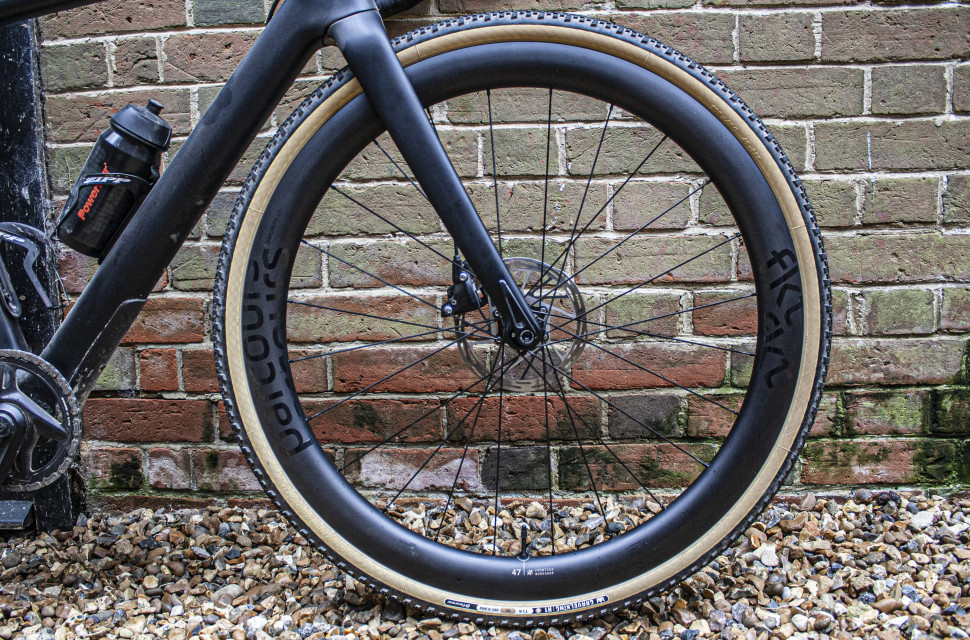







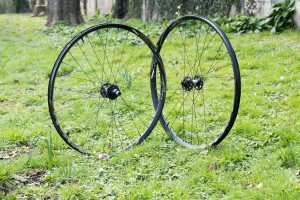
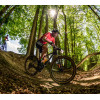
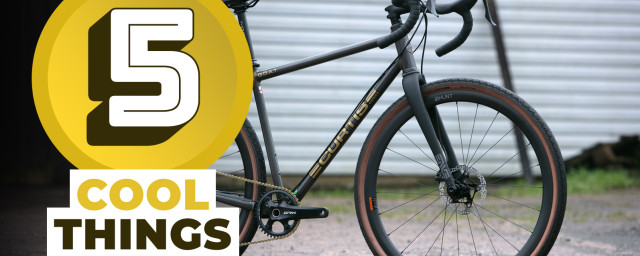

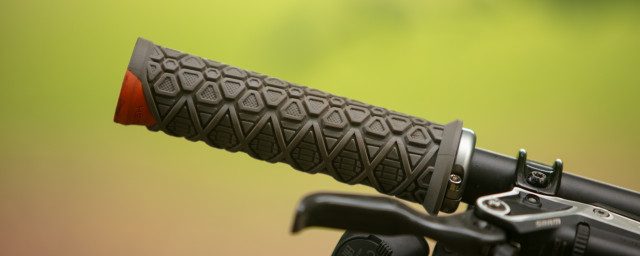
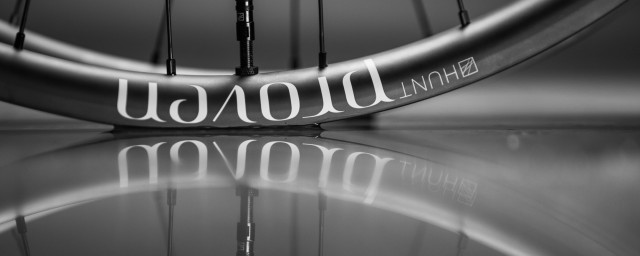
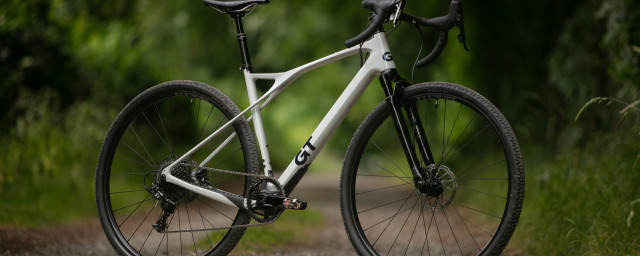


2 comments
+1.5km/hr - did you have times on the same loops from other wheelsets with the same tyres at the same pressures? If you started at 60psi it suggests you're not used to lower pressures (I'd consider 35-40 a starting point at 10kgs heavier than you) but maye I'm reading it wrong. Thanks.
Is something pronounced Fucked really a good choice for a set of wheekls?